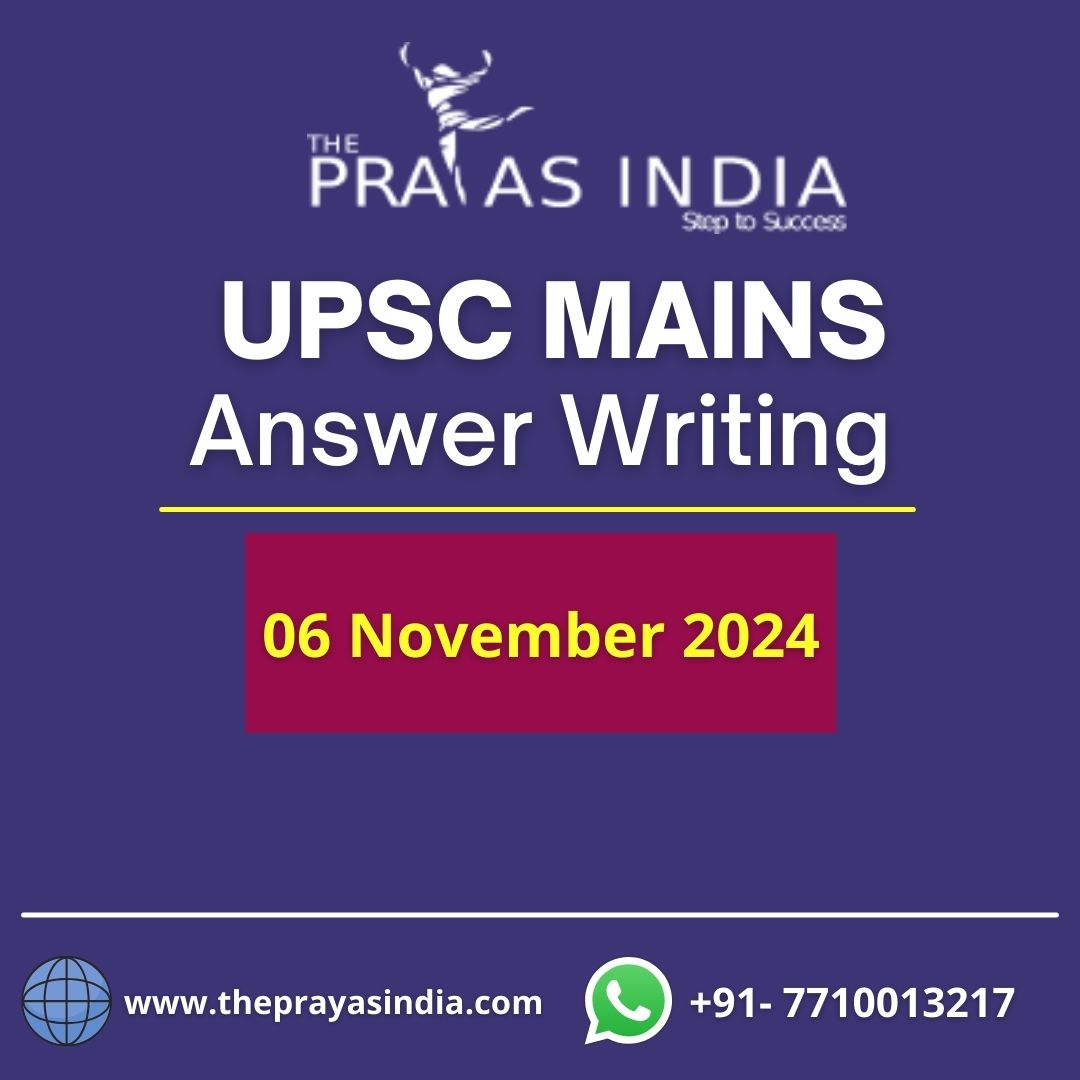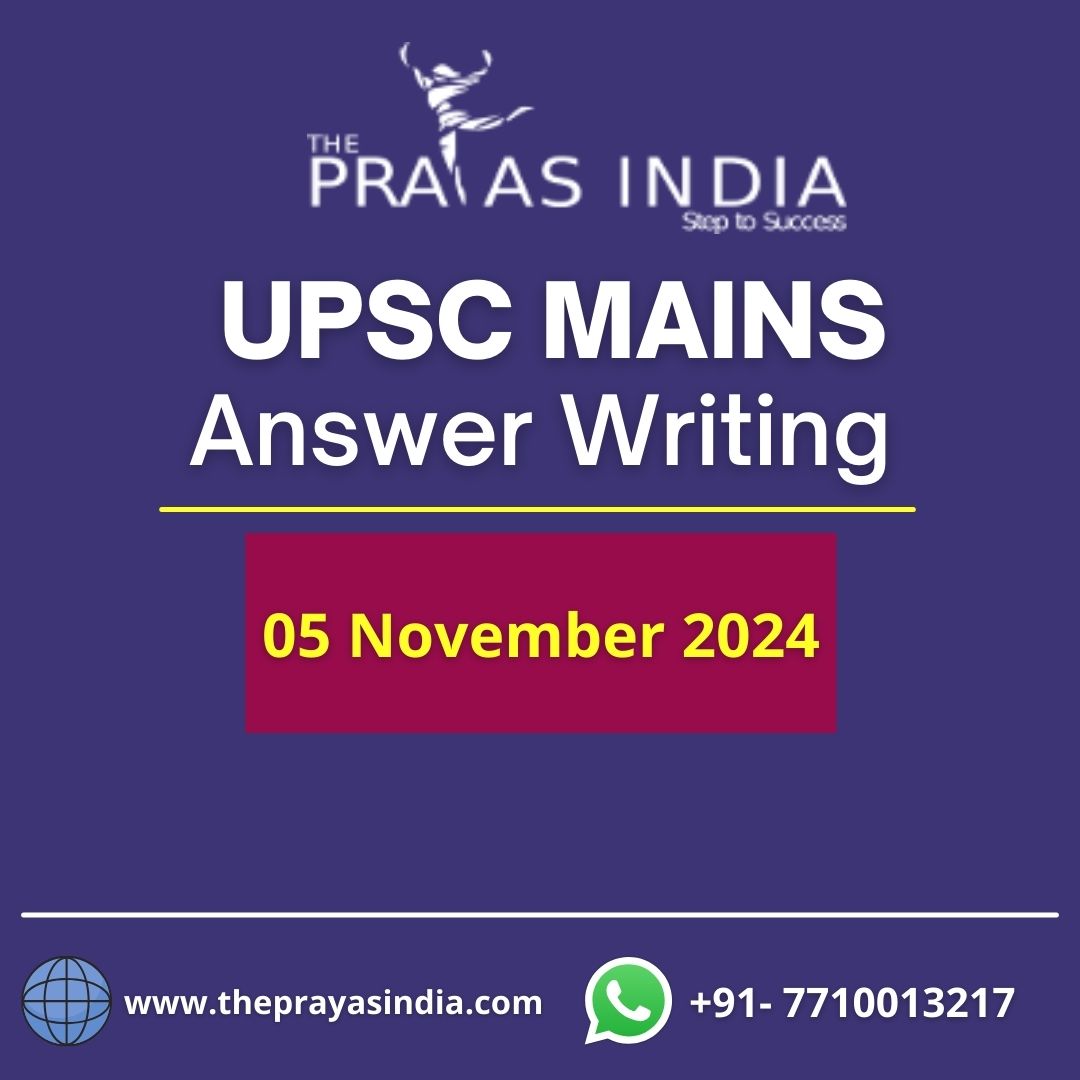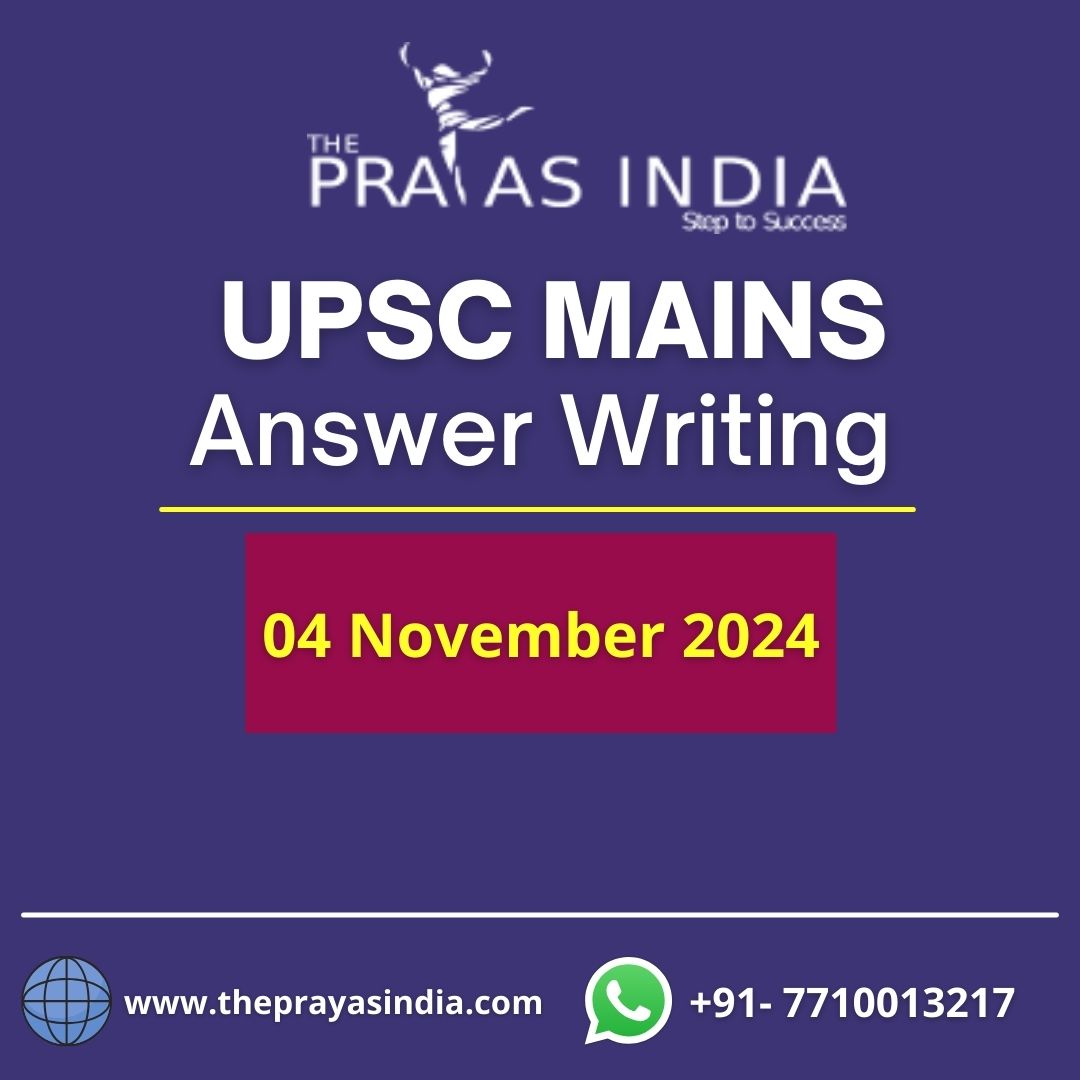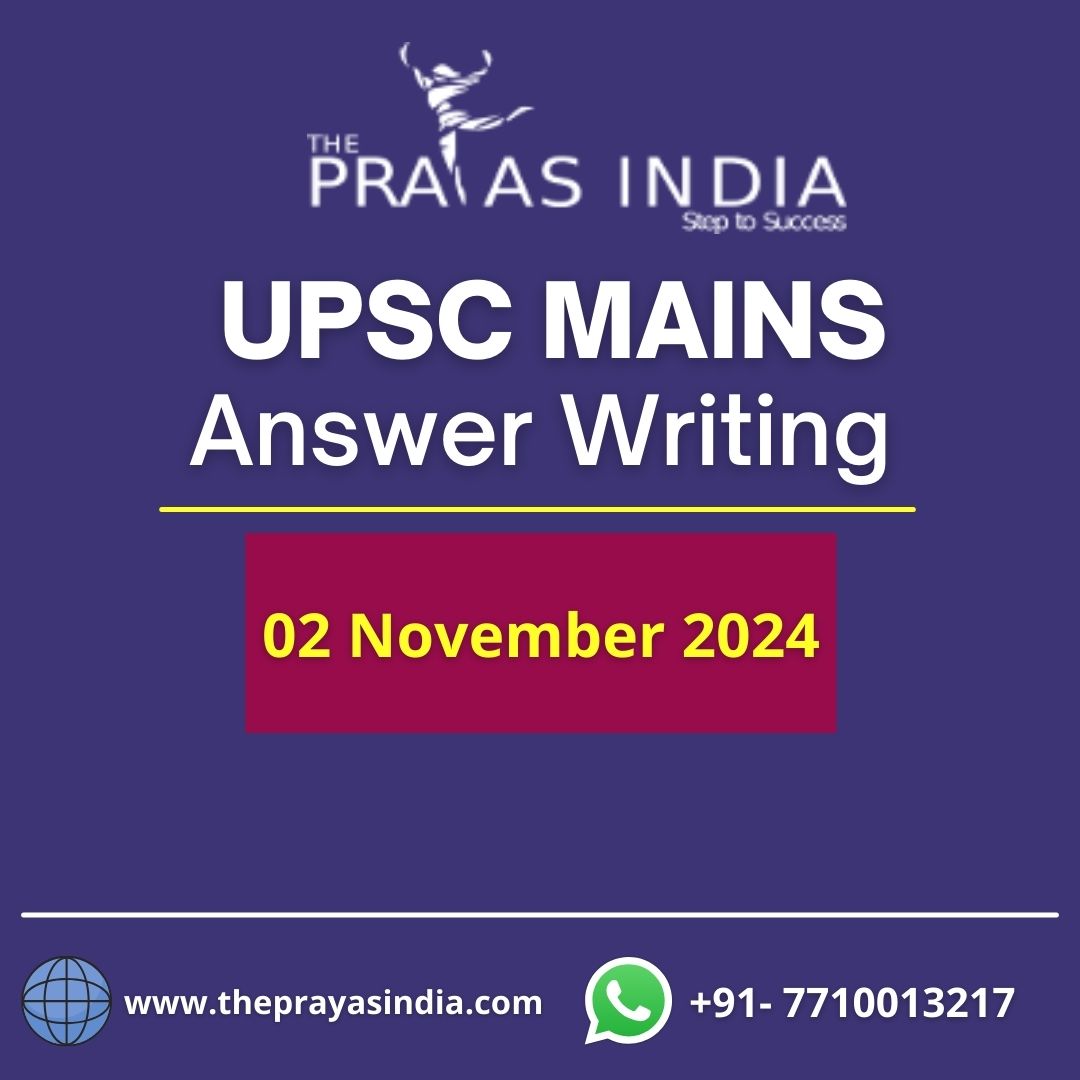DAILY QUESTIONS & MODEL ANSWERS
Q1. Consider the impact on basic rights of the declaration of a national emergency. offer some light on how the suspension of fundamental rights is interpreted by the law. (250 words)
Paper & Topic: GS III – Constitutional Provisions
Model Answer:
Introduction:
- When war, external aggression, or armed insurrection endanger the security of India or a portion of it, the President is permitted by article 352 of the Indian Constitution to proclaim a national emergency. A national emergency that is declared as a result of “war” or “external aggression” is referred to as a “External Emergency.” On the other hand, when it is a result of a “armed rebellion,” it is referred to as a “internal emergency”.
Body:
The effects of a declaration of a national emergency on fundamental rights:
- The six fundamental rights under Article 19 are immediately suspended when a declaration of national emergency is made, in accordance with Article 358, when such a declaration is made. They are not required to have a separate suspension order.
- The legislative and executive branches’ activities during the declaration of a national emergency in accordance with this cannot be contested in court, even if they are in violation of Article 19.
- The 44th Amendment Act, however, added two restrictions to this: Article 19 rights can only be suspended when a national emergency is announced due to war or foreign invasion, and only those laws relevant to the emergency are guarded from challenge, not other laws.
- Article 359 allows the president to suspend the ability to ask any court to enforce FR during a national emergency. The Rules are not suspended in this case; only their enforcement is.
- The suspension of FRs is restricted to those which are solely stated in the order.
- The 44th Amendment Act placed two conditions on the use of this provision: the president may not suspend the right to petition the court for the enforcement of the FR guaranteed by Articles 20 and 21, and only those laws relating to the emergency are protected, not other laws.
Interpretations of the law addressing the validity of suspending fundamental rights in times of emergency:
- In the case of Minerva Mills Ltd. v. Union of India, the Supreme Court determined that there is no barrier to judicial review of the validity of the president’s 352 emergency declaration (1). The only power the court has is to decide whether or not the constitutional constraints have been upheld. It can establish whether or not the president’s satisfaction is justified. If the justifications for the satisfaction are fictitious, absurd, or unrelated, it is not satisfaction at all.
Article 19 in Makhan Singh v. Punjab State was suspended:
- Section 358 makes it clear that decisions made or not made during an emergency cannot be disputed, even after the emergency has passed.
- Hence, any legislative or executive action that violated the clause could not be contested even after the emergency was declared over. Art. 19 was fully suspended throughout the relevant period.
Articles 20 and 21 being suspended in the matter of A.D.M. Jabalpur v. Shivkant Shukla:
- The President issued instructions suspending the right of any individual to petition any court for the enforcement of their fundamental rights under Articles 14, 21, 22, and 19 for the duration of the emergency in accordance with Article 359(1) of the Indian Constitution. The right to life and personal liberty are recognised as non-discriminatory rights under Article 4 of the International Covenant on Civil and Political Rights, including in times of emergency.
- State of Rajasthan v. Arjun Singh: Suspension of Articles 14 and 16
- While not being particularly specified in the decision, the Rajasthan High Court concluded that even if art. 14 was suspended, art. 16 remained in force. The court emphasised that under article 359 of the constitution, only those fundamental rights that were specifically and expressly specified in the presidential order were suspended.
Conclusion:
- It is vital to recall that, even though these measures are created for the security of the country and the protection of the public, they nonetheless grant the President vast discretionary authority. The country’s federal structure is affected by this and is essentially changed into a unitary one. Since this will act as an internal check to make sure that the Parliament and the Executive are not abusing their discretionary powers, the courts should have the authority to expand the powers of the Centre.
Q2. The management of Covid has garnered strong criticism from all sides, and the WHO has not been able to do much to support communities in need of vaccines. Critically evaluate the situation and offer suggestions on how to democratise global health governance. (250 words)
Paper & Topic: GS III – Health related issues
Model Answer:
Introduction:
- The World Health Organization, which is an arm of the United Nations, specialises in international public health (WHO). It was established on April 7, 1948, and Geneva, Switzerland, serves as its headquarters. The WHO is a component of the United Nations Development Group.
- In organising the global response to the COVID-19 epidemic, it has been crucial. Yet, the stance and the response were criticised for being insufficient.
Body:
Criticism of WHO’s pandemic response:
- Lack of readiness: The WHO already had information about the SARS outbreak and had conducted years of subsequent research.
- A 2007 study article had earlier issued a warning due to the virus’ propensity for mutation, China’s expanding urbanisation, its proximity to exotic animals, and its incapacity to crack down on the illegal wildlife trade.
- In 2015, the illnesses brought on by the coronavirus family were selected as one of the top priority in need of immediate research and development.
- It was selected as the leading candidate for recently discovered illnesses most likely to trigger a sizable epidemic. This finding was confirmed by the WHO’s 2018 annual review of priority diseases.
- Many people have criticised the government’s inexplicable delay in declaring COVID 19 a “public health emergency of worldwide concern” (PHEIC).
- A PHEIC was under consideration by the WHO emergency committee after various countries from around the world asked for guidance.
- The WHO indicated that “the focus is not so much on the data” and that no decisions had been made. It was ultimately compelled to declare once the number of confirmed cases increased tenfold across 18 nations.
- In light of the fact that COVID 19 was exhibiting pandemic-like characteristics, such as spreading rapidly over the world, the WHO decided to delay calling it a “pandemic.”
- The WHO was unwilling to act quickly enough to deploy an investigation team to China. A WHO-Chinese group recently paid Wuhan a visit in the middle of February.
- Absence of Taiwan: Taiwan has been consistently barred from joining the WHO on the basis that the island is governed democratically by China ever since China joined the UN in 1971.
- The WHO’s continued adherence to the “One China” policy, which recognises the Beijing government as the legitimate government of China, was a significant obstacle in the fight against the pandemic.
- the virus’s propensity to transmit from person to person was not recognised right once, especially after the first case was discovered outside of China.
- Taiwan informed the WHO of the matter as early as the end of December 2019, but nothing has changed.
- Recent discoveries conclusively demonstrate that China remained silent regarding its understanding of human-to-human transmission.
- Claims that the numerous travel restrictions that countries implemented to combat COVID-19 violated the IHR, violations that the WHO had the ability to investigate but decided not to do so.
- Instead, the WHO advised states to refrain from enacting travel restrictions in order to prevent fostering stigma and fear.
- Even the US’s early travel restrictions were attacked as being needless and excessive.
- It is admirable that WHO is supporting the creation of coronavirus vaccines and medications.
- The WHO has won praise for its work promoting knowledge exchange and battling false information and deception on the internet.
Democratization of global health governance measures:
- By creating new departments for research, antibiotic resistance, and digital health, the WHO may expand its technological skills. By doing this, the WHO will be able to broaden the scope of its expertise and keep up with the most recent issues and solutions in the field of public health.
- Help WHO, which cannot do everything and frequently finds itself responding to events rather than defining its own agenda, to concentrate on its goal. Member states might feel more motivated to give more if they have a better grasp of how their funds are being utilised.
- Since the Wolcott & Melinda Gates Foundation and Doctors Without Borders are two key global health players who are not addressed by these reforms, coordination with other international stakeholders is required.
- Resources should be made more readily available. The 4.42 billion budget for the WHO’s current biennium is mostly defined by donors and their priorities, leaving the organisation with little control over the funds.
- The health sector receives a lot of funding, but it is unequally split between “major” diseases (vertical) and developing the health system (horizontal).
- In order to make the best use of the available health resources, there is also a lack of evaluation, accountability, and sustainability, which necessitates a significant overhaul and modifications to traditional donors and funding systems.
Conclusion:
- The WHO is subject to a great deal of criticism, which has negatively impacted both its status and reputation globally. The politicisation of the WHO continues to be a source of great concern, but it also presents an opportunity to reevaluate the fundamental tenets of the larger system of international governance. The recently proposed WHO reforms need to be implemented right away. It must effectively address its reliance on donors and waning capabilities if it is to realise its triple-billion-dollar objectives in the future.




